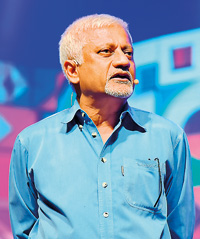Doing good, cashing in, making a change and creating impact
Yes all this can be done.

Prof. Rohan Samarajiva speaks at the event.
Doing good and doing well are polarised themes, taken in a political context. Why? Because doing good is a core principle in socialism while doing well (and maximising returns to shareholders) is a capitalist notion. But they aren’t mutually exclusive as Prof. Rohan Samarajiva, Chairman Information and Communication Technology Agency of Sri Lanka (ICTA) confirmed in his opening speech at the fourth edition of Disrupt Asia Festival recently.
“In the end we want impact. We want to make a change in the world. We want to do good. We want to change markets. We want to make money.
I don’t think any of these are of less value than anything else. If you can do good and make money that is better than just doing good.” So keep an eye on that end goal of having an impact on the world that we live in, he continued.
He reiterated that the ‘world’ means not ‘this little market of 21 million people’. “I keep telling people that Sri Lanka’s market size can be compared to that of greater Mumbai. In greater Mumbai 20 million use the public transport system every day. So we have 21 million people here about the same size. Maybe Mumbai is even larger than here. So we need to think big. We need to think of our region. We need to think of Asia.
That is why this is called Disrupt Asia not Disrupt Sri Lanka.” The ICTA industry development team has been recognised for providing the best eco systems, he added noting, “And that team is all of you and that team is all these people working together, cooperating and collaborating and meeting is going to give us the results we want.”
He encouraged the audience to keep an eye on that end goal as they do what they do today and do what they do throughout the year, as they think of new things to do, as they think of new partnerships, as they enter into transactions. “When doing all these, think of the end objective: Having an impact on the world. In the meantime, have some fun. That’s why we call this a disruption festival. It’s not a disruption ceremony. It’s a festival. Have some fun. That’s what I have to say, welcome, have some fun and have an impact on the world.”
The ‘Travel Tech – Travel Smart’ panel discussion focusing on technologies related to the travel and leisure sector saw corporates in the travel sector gain new industry insights. Expert panellists from the international travel industry such YoHo Bed Co-Founder, Hifnaz Jiffrey revealed insights into gaining a better understanding of tourist flows, customer behaviour, and ability to predict future technology-related megatrends with an aim of enabling personalised, connected and sustainable travel. He said that YoHo Bed aims to integrate their business into the AirBnB application.
Mr. Jiffrey said that 60 per cent of their bookings come from their mobile application. “Our vision for our mobile application is that basically, you cannot just book your hotel, but completely book your entire experience. What AirBnB would do on the global scale, we are going to do in the local scale and probably integrate with AirBnB.” Deputly Lead Digital AirBnB, Rachel Bartholomeusz and Head of Destination Marketing Asia Pacific, Sarah Mathews also spoke on the panel.
According to him, the company has understood local pain points. “If you look at the pricing in the sector we operate in, most people doing their pricing is by gut feel or by competitors. There is no scientific reason to the pricing. We built a data driven approach for pricing. We looked at the airline industry and worked on demand and supply.”
Ms. Bartholomeusz said that AirBnB felt it was important to localise their service and that it is localised in China. “Our interface is run through the WeChat app. We are not known as the AirBnB app. The AirBnB look is different in every market. We have recently brought in Arabic that brought a whole heap of challenges.”


